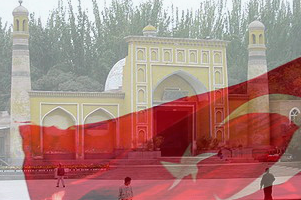Turkey and China: Merging Realpolitik with Idealism
By Hay Eytan Cohen Yanarocak (vol. 8, no. 15 of the Turkey Analyst)
Despite the importance and improvement of multi-dimensional Turkish-Chinese relations, Turkish decision makers have had difficulties reconciling their Pan-Islamic ideological rhetoric and the demands of realpolitik. While Ankara recognizes the need to form good relations with China, its self-assigned role as the protector of “oppressed Muslims” has, so far, trapped Turkey between realpolitik and the purism of ideology. Having acknowledged this clash, President Recep Tayyip Erdoğan has moved to neutralize the discord that has existed between Turkey’s national interests and its Pan-Islamic ideological rhetoric. Erdoğan’s new China strategy promises to pave the way for solid, stable relations between Turkey and China.

Turkey Is Not Going to Be “Normalized” Under the AKP’s leadership
By Toni Alaranta (vol. 8, no. 14 of the Turkey Analyst)
There is widespread expectation that “normalization” and democratic consolidation will follow the June 7 election, which deprived the ruling Justice and Development Party (AKP) of its majority. The talk about “normalization” and President Recep Tayyip Erdoğan becoming “isolated” presupposes that Turkey’s democratic travails emanate exclusively from Erdoğan’s power hunger, and that once this factor is eliminated, the AKP will once again become the “normalizing force” it allegedly was previously. However, “normalization” would mean abandoning not only Erdoğan but the very political narrative disseminated by the AKP during its years in power, and thus the mission of the party.
The Case for a Coalition with the CHP: the AKP Needs to Refurbish Its Image in the West
By Halil Karaveli (vol. 8, no. 14 of the Turkey Analyst)
The AKP’s loss of its absolute majority in the June 7 parliamentary election may paradoxically offer the regime the chance to refurbish its tarnished image in the West. That, at least, is how some of the leading representatives of the regime judge the present situation. A coalition government with the center-left CHP is perceived as a chance for the AKP to rid itself of the charges of authoritarianism. Western endorsement has always been critically important for AKP, and the party is desperate to regain its lost legitimacy in the West. The question, though, is why the CHP would even contemplate lending itself to a project that would only entrench the AKP regime.

Turkey’s Kurds and the Post-election Political Landscape
By Gareth Jenkins (vol. 8, no. 13 of the Turkey Analyst)
The Turkish general election of 7 June stripped the ruling Justice and Development Party (AKP) of its parliamentary majority for the first time since November 2002 and dealt a devastating blow to President Recep Tayyip Erdoğan’s hopes of replacing the country’s parliamentary system with an autocratic presidential one in which all political power was concentrated in his own hands. But, even though the election was an undoubted triumph for the pro-Kurdish Peoples’ Democratic Party (HDP), it has also left the Kurdish nationalist movement facing a number of challenges.

What the Columnists Say
Abdülkadir Selvi in Yeni Şafak reports that Turkey is determined to take action in Syria if the PYD expands to the west of the Euphrates, taking control of Jarabulus, but that this does not mean that Turkey is about to go to war. Özgür Mumcu in Cumhuriyet writes that Turkey is dreaming about a military operation that is internally marketed as an operation against PYD, while it is externally marketed as something that supposedly targets ISIS. Orhan Kemal Cengiz in Bugün writes that the question after the election was if Erdoğan was going to interpret the results as a no to the proposed, unlimited powers of the presidency or as a “road accident,” and concludes that it’s now business as usual for the president. Orhan Bursalı in Cumhuriyet writes that it is very difficult for AKP to accept that the party has lost the possibility to form a majority government on its own, and that the party and the “Mighty” – Erdoğan – intends to never relinquish power. Candaş Tolga Işık at the Habere Dikkat news site writes that handing the seat of the speaker of the parliament to AKP as a gift, only because MHP is unable to curb its hatred of HDP, is going to be the undoing of the party.




